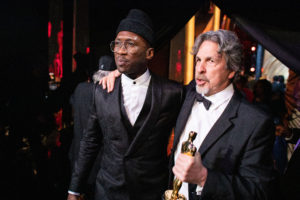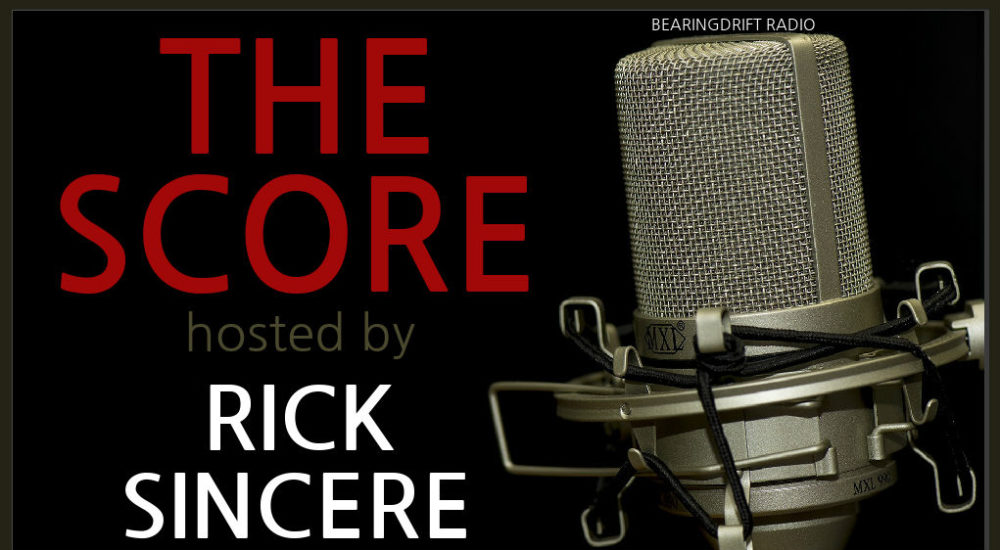The Score: CPAC 2019, Green Book, Death Penalty, Log Cabin, Red Maryland
This week on The Score – Did Green Book deserve its Best Picture Oscar? What’s happening at the 2019 Conservative Political Action Conference? How do Maryland and Virginia politics compare? Is there a future for gay and lesbian Republicans? Should conservatives be concerned about the death penalty?
CPAC
This week The Score took me to the forty-fifth annual Conservative Political Action Conference, or CPAC 2019, at the Gaylord National Resort in National Harbor, Maryland, near Washington, D.C. I talked to so many people at CPAC that we will have to reserve some of those conversations for next week. Some conversations were social and not formal interviews, such as when I met public radio talk show host Joshua Johnson of The 1A out of WAMU-FM in Washington, or upon running into Charlottesville radio host Joe Thomas of WCHV-FM on Broadcast Row.
Craig Shirley and Ronald Reagan
 It may be best to start at the beginning. Craig Shirley is a political consultant and historian who has chronicled the life and career of President Ronald Reagan. Craig told me that “CPAC was invented for Ronald Reagan,” who spoke at every gathering in the 1970s and 1980s, except during the election years of 1976 and 1980. I spoke to him after he finished signing copies of some of his recent books for fans in the CPAC Hub and I asked him what he learned about Ronald Reagan doing research as a historian that he did not know from working for Reagan and living through that time period.
It may be best to start at the beginning. Craig Shirley is a political consultant and historian who has chronicled the life and career of President Ronald Reagan. Craig told me that “CPAC was invented for Ronald Reagan,” who spoke at every gathering in the 1970s and 1980s, except during the election years of 1976 and 1980. I spoke to him after he finished signing copies of some of his recent books for fans in the CPAC Hub and I asked him what he learned about Ronald Reagan doing research as a historian that he did not know from working for Reagan and living through that time period.
Until I got into writing about Reagan and reading his writings and reading his op-eds and reading radio scripts is that how thoughtful this man really was. He was very much a libertarian conservative but not libertine. He truly, truly believed in the rights and the dignity and the freedom of the individual. Another Reagan biographer called him “Emersonian,” and he was; Reagan was a child of the Enlightenment, so I guess, is that how refined and how nuanced and how sophisticated his thinking was, is what I what I learned about Ronald Reagan.
Shirley is author of Reagan’s Revolution: The Untold Story of the Campaign That Started It All (2010), Rendezvous with Destiny: Ronald Reagan and the Campaign That Changed America (2011), December 1941: 31 Days that Changed America and Saved the World (2013), Last Act: The Final Years and Emerging Legacy of Ronald Reagan (2015), Reagan Rising: The Decisive Years, 1976-1980 (2017), and Citizen Newt: The Making of a Reagan Conservative (2017). His next book, Mary Ball Washington: The Untold Story of George Washington’s Mother, is scheduled for publication in September.
The Score featured an interview about December 1941 from the archives last December, drawn from my conversation with Craig after he spoke on a panel about World War II at the 2014 Virginia Festival of the Book in Charlottesville.
Conservatives Concerned
 The exhibitors area at CPAC has a wide variety of organizations, businesses, and individuals trying to sell ideas as well as goods. One of those organizations is Conservatives Concerned About the Death Penalty. I spoke to that group’s senior manager, Heather Beaudoin. (Last August, I pulled another CPAC interview out of the archives, when I talked to the organization’s Matt Maly in 2015.)
The exhibitors area at CPAC has a wide variety of organizations, businesses, and individuals trying to sell ideas as well as goods. One of those organizations is Conservatives Concerned About the Death Penalty. I spoke to that group’s senior manager, Heather Beaudoin. (Last August, I pulled another CPAC interview out of the archives, when I talked to the organization’s Matt Maly in 2015.)
LGBT GOP
 Another group present at CPAC was Log Cabin Republicans, which has had a rocky relationship with the annual conference. This year the gay and lesbian conservative group was represented by its executive director, Jerri Ann Henry. We spoke about the past and future of Log Cabin Republicans.
Another group present at CPAC was Log Cabin Republicans, which has had a rocky relationship with the annual conference. This year the gay and lesbian conservative group was represented by its executive director, Jerri Ann Henry. We spoke about the past and future of Log Cabin Republicans.
Our conversation included a topic that Craig Shirley addressed in his earlier interview on The Score, that is, Ronald Reagan’s role in defeating the Briggs Amendment in California in 1978. (That was a voter initiative that, if it had passed, would have prohibited gay men and lesbians from working as teachers in the Golden State’s government schools.)
Conservative Environmentalism
 CFACT, or the Committee for a Constructive Tomorrow, is a conservative environmental organization co-founded by David Rothbard and Craig Rucker in 1986. I had not seen Craig Rucker in over twenty years, but this weekend at CPAC, we had a reunion and an opportunity to talk about CFACT’s history, its mission, and its activities, including its presence on college campuses. We talked about alternative sources of energy (nuclear, wind, solar) and how the market is better at “being green” than government coercion is.
CFACT, or the Committee for a Constructive Tomorrow, is a conservative environmental organization co-founded by David Rothbard and Craig Rucker in 1986. I had not seen Craig Rucker in over twenty years, but this weekend at CPAC, we had a reunion and an opportunity to talk about CFACT’s history, its mission, and its activities, including its presence on college campuses. We talked about alternative sources of energy (nuclear, wind, solar) and how the market is better at “being green” than government coercion is.
Last April, The Score featured a tribute to CFACT co-founder David Rothbard, who had passed away earlier that month, including an interview from the archives from CPAC in 2012.
Green Book at the Oscars

This year’s Academy Awards were distributed widely among the nominees. Roma, directed by Alfonso Cuaron, won three Oscars. So did Bohemian Rhapsody. Director Spike Lee won his first Oscar, for best adapted screenplay for BlacKkKlansman. Olivia Colman was the surprise winner for best performance by an actress in a leading role as Queen Anne in The Favourite.
Another surprise was Green Book, which took home the awards for best supporting actor (Mahershala Ali), best original screenplay, and best picture of the year. That best picture Oscar brought Green Book some backlash. Our film critic, Tim Hulsey, reviews Green Book and finds the negative criticism unwarranted — a position shared by Washington Post film critic Ann Hornaday.
Tim concludes:
I suspect some of the backlash against Green Book maybe due to old fashioned snobbery. The idea that a character from the deplorable working classes who sometimes thinks bad thoughts might nonetheless be a fundamentally decent individual worthy of audience empathy, seems to rub many cultural pundits the wrong way nowadays. When presented with a crowd-pleasing, humanist. traditional liberal film like Peter Farrelly’s Green Book, which finds good and bad people everywhere and allows flawed but decent people the space to become better, our culture warriors of the left flock instead to the implacable divisions and white-trash stereotypes of a film like Spike Lee’s BlacKkKlansman or, for that matter, to Aaron Sorkin’s new stage version of To Kill a Mockingbird, which treats Atticus Finch’s compassion for his lower-class white neighbors as an unpardonable character flaw.
But when an entire group of people is deemed unworthy of basic empathy, it encourages the worst possible behavior toward real or perceived members of that group — as Green Book demonstrates on multiple fronts, again and again. Even in the best of times it’s difficult to overstate the need for affirmative entertainment that expresses positive common values, but given our fractious political, social, and cultural climate in which even an innocuous baseball cap can spark national outrage, a modest, crowd-pleasing film like Green Book might be just the thing we need. It warns us not to judge other people until we’ve walked a mile in their shoes and, along the way, celebrates the healing and uplifting power of music, food, faith, and friendship.
(Note that the 2018 narrative feature film, directed by Peter Farrelly, should not be confused with the 2019 Smithsonian Channel documentary, The Green Book: Guide to Freedom.}
Red Maryland
 Let’s go back to CPAC. One of the fun aspects of the annual conservative conference is running into old friends – like Craig Rucker, who appeared in the first part of this week’s show – and making new ones.
Let’s go back to CPAC. One of the fun aspects of the annual conservative conference is running into old friends – like Craig Rucker, who appeared in the first part of this week’s show – and making new ones.
In this case, I met Brian Griffiths, a podcaster for RedMaryland.com, a political web site much like Bearing Drift in its mission and points of view. Brian and I interviewed each other simultaneously, looking at the similarities and differences between Virginia and Maryland politics. Among the topics: political scandals, race relations, and legislative redistricting.
Brian beat me to it in posting audio of our encounter on line. You can listen to his entire podcast here.
From the Archives
This week our “From the Archives” segment features an interview with Fred Karger, who made his mark on history in 2012 when he was the first openly gay man to seek the Republican nomination for U.S. president. Karger has been in the news recently because the mayor of South Bend, Indiana, 37-year-old military veteranPete Buttigieg, has become the first openly gay Democrat to seek his party’s nomination, in the crowded 2020 field.
In March 2013, I asked Karger about his experience as a candidate.
Next week we will have more interviews from CPAC, including conversations with John Hinderaker of the Center of the American Experiment, Scott Melbye of Uranium Energy Corp., and Chris Skates, an advisor to Kentucky’s governor.
The Score will be back.


